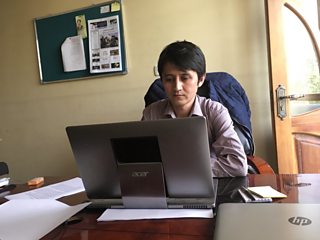With the law on your side, it still takes determination to get the story
Najiba Feroz
Journalist, 主播大秀 News Channel

Journalists on a UNESCO training course in South Sudan. Photo: Frederique Cifuentes/UNESCO
Access to information is one of the most important aspects of media freedom, enabling journalists to produce accurate work. A recent says that 112 countries currently have freedom of information laws or similar legislation.
Marius Lukosiunas from the Freedom of Expression and Media Development Centre at UNESCO calls the adoption of these laws a key to transparency within governments: “having laws for accessing information is highly important for people around the globe. This is part of a human right - the freedom of expression right. If your right to access information is not guaranteed so the freedom of expression right is not fully implemented.”
The UN General Assembly has adopted the , which includes the goal of ensuring public access to information. But it isn’t enough for governments to pass freedom of information laws. Implementation mechanisms are required to make sure that such guarantees work in practice. The laws are no guarantee of access to information when authorities can easily disobey them.
Afghanistan passed legislation in 2014 that ensures the country’s citizens the right to access information from government institutions. But journalists in Afghanistan still complain about a lack of cooperation from public authorities and long delays in providing information they have requested.
Zaki Daryabi is the editor-in-chief of the Etilaat-e-Roz newspaper. The local paper has recently published several investigative pieces on social and political issues in Afghanistan. I asked Daryabi about his experience of getting information from governmental departments: “Afghanistan’s access to information law does not have enough executive guarantees,” he said. “We wanted to produce an investigative report on the absence of members of parliament in Afghanistan and requested information based on the law. We waited long but got nothing. Then according to legal procedure, we filed a grievance to the complaint committee of the access to information law. We still haven’t heard anything from the Afghan parliament. The law doesn’t specify what the next step should be if the grievance submission is ignored.”

Zaki Daryabi, editor-in-chief, Etilaat-e-Roz
On the one hand this is about the law and how it works; on the other hand, we are talking about journalism - a profession whose core principle is digging out information - and in that, there’s no substitute for persistence. Effective and powerful media outlets will always depend on journalists who are passionate about what they’re doing and work hard to acquire high-quality information.
Furthermore, the emergence of social media and citizen journalism has raised the bar for professional journalists in mainstream media. We are expected more than ever to provide accurate information based on credible sources that are not easily available. According to the 主播大秀’s editorial guidelines, accuracy in all output is a fundamental principle and we should try to gather first-hand information and provide secure evidence.
Working as a journalist for more than a decade has taught me that being persistent is essential if you want to get the right information from the right people at the right time. The existence of mostly-approachable press offices in both government and non-governmental organisations in the UK makes life easier for journalists and helps us gather information more painlessly than my fellow journalists and I experience in Afghanistan. Yet even in the UK, you will not get the required fact or figures or have officials provide you with first-hand information without chasing persistently.
Working in the 主播大秀 newsroom, I don’t rely on just sending emails to the press offices or to the officials I want to speak to: I keep contacting them via phone, text or other channels until I get answers. In some cases, I would get no answer to my first inquiry or sometimes the answer is incomplete or ambiguous. I will then follow it up and try to be clearer and put emphasis on the importance of the requested data or getting the right person to speak about a story.

The author in the 主播大秀 newsroom
Sometimes I bid for guests for several hours until I get them for our programmes. It’s tough and stressful. However, being persistent has long-term advantages: authorities and their press offices know you by your persistence and this builds the relationship. In future, when new information is about to emerge, they may inform you in advance.
UNESCO has proclaimed September 28 as International Day for Universal Access to Information. Marius Lukosiunas told me that ahead of the day, UNESCO is holding global awareness campaigns to promote freedom of information law and train journalists in how to use it.
“It’s very important for governments to put in place a number of promotional measures on access to information laws,” he said, “to inform not only journalists but also the larger population that this kind of law is available”. Nonetheless, the freedom of information law can only be implemented when journalists are committed to doing so and that requires professionalism and being passionate about provide high-quality information to audiences.
Najiba Feroz on
